- Home
- Nicholson Baker
The Anthologist Page 5
The Anthologist Read online
Page 5
Auden is an interesting case. He believed that you should write drunk and revise sober. That was his rhythm. And it worked for him for a while. Then he mistakenly mixed in an alien chemical: speed. The poetry that he wrote on speed is no good. The poetry he wrote in the thirties, before he found speed, is good. Speed hurried him into the realm of the abstract noun. He was stuck fast on speed. Sartre took speed, too—and wrote Being and Nothingness, which is a gigantic smoke generator of abstraction.
So speed is a bad idea. And suffering is a good idea. You have to suffer in order to be a human being who can help people understand suffering.
I have a mouse in the kitchen.
AUDEN SAYS: “About suffering, they were never wrong, the eld mesters.” He has a pronounced Oxford accent. The poem actually rhymes, but subtly. One line ends “forgot,” and then there’s “untidy spot.” It’s such a famous poem I almost hesitate to bring it up. But I do hope you will read it.
The famous part of the poem is about Breughel’s Icarus. About the fact that there’s a whole painting of a seaport, with all these people’s lives intersecting, bales being loaded and unloaded onto ships, and there off to one side, shploof, is Icarus, plunging into the water with his wings all melted. Not that wax could have ever worked. It was not a good idea and anyone could have told the two flyers that they’d need something stronger than wax. But the myth is poked into this completely real and commonplace in some ways but beautifully sunlit painting of a harbor. That’s the famous part of the poem.
But if you listen to Auden read it, you can’t skip ahead to the Icarus part, and you realize that a lot of the poem isn’t about that painting. It’s about the torturer’s horse, and about how the “dogs go on with their doggy life.” Nobody ever put that way of talking in a poem before. That’s the Christopher Isherwood note. “The dogs go on with their doggy life / And the torturer’s horse scratches its innocent behind on a tree.” When Auden reads it, that’s what you remember. You can hear his own amazement that he had been capable of that simple, completely new bit of poetic speech. Christopher Isherwood was a huge influence on Auden. That’s what people don’t understand. Isherwood is partly responsible for Auden’s greatness. When they went their separate ways, Auden’s poetry grew colder and more abstract. Isherwood was the wax on Auden’s wings.
I BOUGHT A CHIN-UP BAR and a badminton set. They were both surprisingly cheap. The badminton set comes in a clear zippered case—birdies, rackets, and net, all neatly packed. You can buy purple birdies now, as well as white birdies. What is it like to play in the cool of the twilight with a purple birdie? I don’t know. Does anyone make birdies out of actual tailfeathers anymore?
I think I bought the badminton set because I had an idea that I would practice, refine my skill set. Perhaps work on picking up the birdie from the grass without getting a nose-bleed. But how can you really practice badminton on your own? You can’t. You can bounce a tennis ball against the barn door, and I used to do that in the summer when I was fourteen and didn’t have anyone to play tennis with. But you just can’t bounce a birdie against the barn and get anything useful from it. I thought of calling up my friend Tim and asking him if he would like to play badminton, but that just seemed silly, and anyway I’d be using him to improve my game so that if Nan and Chuck invited me to play badminton again I’d be better at it, which didn’t seem very nice. He’d be like a human batting cage. Also Tim’s stomach has gotten large, and he’s self-conscious about that.
What’s the meter of badminton? There’s a hard one, friends. Poink, poink, poink. “Break, break, break, / On thy cold gray stones O Sea.” A monosyllabic meter. And tennis? Tennis is a slow duple meter. Pa-pock, pa-pock, pa-pock. “Two roads—diverged—in a yell—ow wood.” Hm, “yellow” doesn’t work. Fault—thirty love. Love means nothing in tennis, as you know. Frost said that free verse was like playing tennis without a net. Lawn Tennyson. Marianne Moore was a lifelong tennis player but not a good metrist. She had a pet crow, and she circled her rhyme words with different colored pencils. Mina Loy once said, Imagine a tennis player who wrote poems. “Would not his meter depend on his way of life?”
Ping-Pong—now there’s a fine rollicking meter. You can recite Macaulay’s Lays of Ancient Rome to a game of Ping-Pong. Try it:
Through teeth, and skull, and helmet
So fierce a thrust he sped,
The good sword stood a hand-breadth out
Behind the Tuscan’s head.
Thomas Babington, Lord Macaulay. This used to be the poem that all little boys read in English private schools. It was violent, and it was nasty, and it galumphed right along. Headmasters would give this poem out as a present to their prize students. And 0.00001 percent of these little boys who read this poem ended up becoming great English Ping-Pong players. More to the point, 0.0000000001 percent of them ended up becoming great English poets. That was the glorious, indispensable inefficiency of the British educational system.
Macaulay’s theory, which he explained in his introduction, was that the Latin poetry that survived, that made it through the dark and sketchy times, wasn’t representative of the songs people had sung in Rome. The literary poetry of Horace and et cetera had survived because it wasn’t memorable. It had to be written down. It didn’t stick in your head. The “lays”—the popular love songs and drinking songs and war songs—were all lost, every single one. So Macaulay, who was by the way a venomous essayist, wrote these bloody imaginary battle ballads to supply the lack.
Macaulay’s Lays of Ancient Rome. “Through teeth, and skull, and helmet—” Crunch. “So fierce a thrust he sped—” It’s completely disgusting and repellant.
Three end-rests in that four-line stanza. Right? Four beats in each line. Lines one, two, and four have rests, line three doesn’t, and that longer line gives it that parrun tun tan, tarran tan tan, tarRUM pum pom pom pom ending.
English is a stressed language, and you want to boom it out sometimes. Then sometimes you want to whisper it, like this: “Give me my scallop-shell of quiet.” Poetry is written sometimes, I think, in a whisper. Not a stage whisper but a real human whisper. A confiding sorrowful whisper, brimful of emotion. And when it’s declaimed it’s ruined. Which is sad, really. Very very sad.
You hear that bird? Chirtle chirtle chirtle chirtle. With birds it’s different. Birds are very different than we are. They don’t know what an upbeat is. They go, Chirtle, chirtle, chirtle, chirtle. And then the next time they might just go, Chirtle—chirtle, chirtle. It’s like some kind of wigged-out aimless Gregorian chant. And then sometimes: Chirtle chirtle. And then: Chirtle chirtle chirt? Questioning. You don’t know where you are with that. The meter is primitive. It’s a primitive meter. But we obviously respond to it. When I hear that chirping, I know that the world is starting up. And that I’d better get something done that day, or I will have failed once again. As I have failed today.
Chirtle chirtle. Chirtle. Chirtle.
Nice chirpin’ there, Mister Birdie! Good one. I like what you did there. That’s good! Funky bitch! Love your work!
5
I PACKED FOUR BOXES of papers in my office, and I threw out lots of things. This cleaning is helping me move forward. I put the chin-up bar in the door and hit my head on it twice because I forgot it was there. Then I took it down and put it in another door. I think if I really cleaned up my office it might be easier for me to finish the introduction, and if I finish the introduction I think I could call Roz with genuine confidence in my voice and tell her that yes, I’d been too much of a wallower in self-doubt but that things were on the mend and I wanted her to come back. I’m about one-seventh done with cleaning the office. Still quite a ways to go. One corner of the room is starting to get that spare, empty look. I do love that spare look.
One of the piles I packed away was a small heap of reviews of my third book of poems, Worn. Not many of them. It wasn’t a good book. Too political in an easy-breezy sort of way. A copy of Rain Taxi had a thoughtful reaction to it
by Renee Parker Task. Charles Simic mentioned the book in one of his omnibus pieces in The New York Review of Books. It was just after Worn came out that I read Amy Lowell’s book Six French Poets. In it Lowell observes that Henri de Régnier had just passed his fifty-first birthday. And she says: “Poetry seems to be, for some strange reason, a young man’s job.” This slapped me in the head like a big heavy cold dogfish. Poetry is a young man’s job. What a frighteningly true thought. Poetry is like math or chess or music—it requires a slightly freaky misshapen brain, and those kinds of brains don’t last. Sometimes if you can hold on into old age you can have another late flowering, like Yeats—much of adult-hood crumbles and falls away, and you’re left with highly saturated early memories and a renewed urge for rhyme. But that happens rarely.
Also as I was cleaning I came across a small paper bag with several strands of raw beads in it. I’d bought them for Roz in a store on Second Avenue in New York. Roz strings beads, she’s very good at it, very quick—she can watch a Chinese movie with subtitles and string beads at the same time, which is very impressive—and as I was walking toward Penn Station I found that I was passing through some kind of wholesale bead-supply neighborhood, with store after store selling raw beads. In each store the strands hung on hooks, arranged by color, strung on fishing lines, and when you went in you felt as if you were in some strange sort of crystallography experiment. I bought some pale gray green-veined beads and some smoky deep-red ones that I thought she would like—they weren’t horribly expensive—and I hid them in my office for her birthday and now here they were. And it wasn’t as if I could call her up and say, Roz, I found a bag holding several strings of raw beads from New York that I was going to give you and would you like to come on back and live here again and string them expertly the way you do while we watch movies together? Because she’d moved out. It was not a nice or welcome development for me for her to move out, it hurt me badly, I’m tottering, but I suppose I deserved it. And now what?
IT’S TIME FOR BED. And here’s what I’m going to do. I’m going to get in bed, and I don’t have anyone to sleep with now, so what I do is I sleep with my books. And I know that’s kind of weird and solitary and pathetic. But if you think about it, it’s very cozy. Over a period of four, five, six, seven, nine, twenty nights of sleeping, you’ve taken all these books to bed with you, and you fall asleep, and the books are there.
Of course it was better when I had Roz in the bed with me. But I don’t have her now. Her warm soft self was extremely comforting, and it’s not there. I could cup her upward hip or one of her dozing boobies with my hand. Good times. That cupping is rhyme—the felt matching of two congruent shapes. And now where she would sleep are these books, and they’re lying there in leaning piles, and sometimes they slip off and nudge me in the eyebrow with one of their corners.
Some of the books are thick, and some are thin, some of the books are in hardcover and some in paperback. Sometimes they get roiled up with the pillows and the blankets. And I never make the bed. So it’s like a stew of books. The bed is the liquid medium. It’s a Campbell’s Chunky Soup of books. The bed you eat with a fork.
I’m hoping that someday I’ll have to clean them out and that somebody will return. But for now, this is what I’ve got.
I ALWAYS SECRETLY want it to rhyme. Don’t you, some of you? Admit it. You open the latest issue of a magazine. Could be Harper’s, could be The Atlantic, or The New York Review of Books, or The New Yorker, or the TLS. Or some swanky literary magazine. You locate the poem, because you’re naturally curious to see what this week’s or month’s trawl is—what it is that was, in the busy mind of that poetry editor, most pressingly deserving of publication. And you look at the poem. There it is. You take in the title—“Way Too Much.” Way Too Much: Okay! And then you check the name of the writer—hmm, Squeef Corntoasty, never heard of him. Or: I sure have seen Squeef Corntoasty’s name popping up in a lot of places lately. Or if it says “translated from the Czech by Bigelow Jones,” forget it, you instantly move on, because translations are never good.
Well, wait—that’s not fair. That’s ridiculously unfair. I’ve read some wonderful translations. Translations of Tranströmer, for instance. But my heart does droop when I see that it’s a translation.
But let’s say this poem is one hundred percent original work. How are you going to approach it? How about we just sort of touch the first line. Just a glance. Take it in, guardedly, without really reading it. Maybe just the first phrase: “I try to sit up straight.” And then you break away to go down the words on the right-hand side. Right down the outer edge. “Pain,” “truffle,” “start,” “shelter,” “an,” and “bell.” Ah. Now you know: it doesn’t rhyme. Once again they’ve done it. They’ve stabbed me right in the god-damned lung. Once again they’ve rejected the whole five-six centuries of our glorious tradition.
But all right—that’s fine. It’s a plum, not a poem. That’s what I call a poem that doesn’t rhyme—it’s a plum. We who write and publish our nonrhyming plums aren’t poets, we’re plummets. Or plummers. And some plums can be very good—better than anything else you might happen to read ever, anywhere. James Wright’s poem about lying on his hammock on Duffy’s farm is a plum, and it’s genius. So is Elizabeth Bishop’s poem “The Fish,” of course. “I caught a tremendous fish”—genius. So you think maybe this plum-poem is good in its own uniquely free kind of way. Is it? You read a line or two. No, it isn’t. In fact, it’s oozing with badness. It’s so bad. How can it be this bad? How can this bad plum be sitting here, in type, in front of me? I don’t get it.
Or maybe it’s one of the very few that do rhyme. These are even worse, sometimes, because the rhyming is so painfully inept—like unclever Ogden Nash gone squiffy.
And yet if you go back and look at old editions of The Nation or The New Republic, which published a lot of poetry back in the day—or if you go farther back, to Reedy’s Mirror or The Century magazine—and if you hunt around for a while in some of those periodicals, you’ll find that most of the poetry in them is just there as decoration. It’s a form of ornament, like a printer’s dingbat. A little acorn with a curlicue. Or the scrollwork on a beaux-arts capital. It’s just a way of creating a different look on the page, and creating the sense on the part of the reader that he’s holding something that is a real Kellogg’s variety pack.
The magazine is going to have some kind of big thoughtful political piece about Teddy Roosevelt, say, and then it’s going to have a bit of serialized fiction, and it’s going to have some “cuts”—that is, some art—and a few color pages tipped in, maybe, if it’s The Century magazine, maybe by Maxfield Parrish, and it’s going to have some poems. The long nonfiction piece comes to an end, and it’s about being a stevedore in Baltimore, something like that. And then at the bottom of the page is this poem in two columns, with six stanzas, and each stanza has indentations, and the conventionality and vapidity of it will stun you. “The shades of summer’s bosky hue, o’erlie thy modest floobie doo.” The editors of The Century didn’t expect you to read that poem with your full mind. They knew it was just some rhymes thrown pell-mell together with some cornstarch. They knew full well, because this is America, land of bad poetry. Yes, sir! Bad poetry, sir! Loads of it in the back, sir! Just keeps coming. Tipped in. The shovel eases the soft tonnage of poetry over the rim, and it just pours into the pit, pluth. The pit of what has been said. And the lost gulls are flapping and calling—peer! peer!
And yet we still want more. There’s still that craving. Give us more, give us new. The hope. The hope that really does: it springs eternal. “Hope springs eternal in the human breast.” That’s clean crisp iambic pentameter. And I have some tips to pass on to you about iambic pentameter, how it’s all a misnomer, as I said. But that’s for later.
“Dear Paul Muldoon, Here’s some new work, I hope you like it, all the best, Paul.” Boy, I wish he didn’t have my own name.
I USED TO SIT there in class, breathing, wondering,
What’s the teacher going to think of next? What’s she going to teach us? Anything? I don’t know. I’m just sitting here. I have no idea what’s coming next.
And one time, she said, Today we’re going to learn something new, and this thing is called “haiku.” She wrote it on the board. And I thought, Interesting word, “haiku.” Nice K.
Somebody discovered haiku way back about a hundred years ago. Obviously it existed for a very long time in Japan, but he discovered it in English. What was his name, that poet? Not Edwin Arlington Robinson. One of those guys who is known now for discovering haiku. And he called it: HOKKU. Hokku. He decided that hokku was a powerful force for order in English.
And he was wrong.
But I didn’t know that. We’re all sitting in the class, at these new desks. This was the sixties, and there were new desks that had recently come in, which had nice metal casters. They moved very smoothly over the linoleum of the floor. They didn’t make the elephant trumpeting sounds that the wooden chairs made. They slid. And we were sitting at these smooth-sliding desks. Sun was pouring in. And they did have a groove to put your pencil in. Although I never put the pencil there.
In some cases they had an under area. Where you looked under, and there were months of your spelling worksheets crushed in. When the teacher told you to clean out your desk you just reached your hand in and you were like an excavator and you grabbed the crumpled paper and you just pulled it out and let it fall directly into the trash can.
So the teacher said: we’re going to learn something new today. A new way of writing poetry. It’s called haiku. And it’s going to allow you—to make art.
And it has a couple of different lines, three lines, and one line has some arbitrary number of syllables, and another line has another arbitrary number of syllables, et cetera. And I heard her describing this, and I knew, even then. I knew even then that it was bogus.

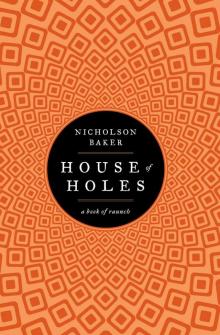 House of Holes
House of Holes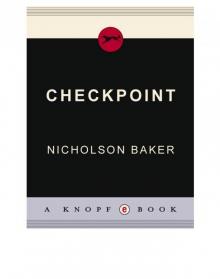 Checkpoint
Checkpoint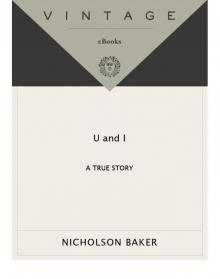 U and I
U and I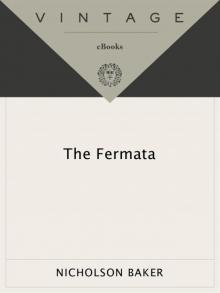 The Fermata
The Fermata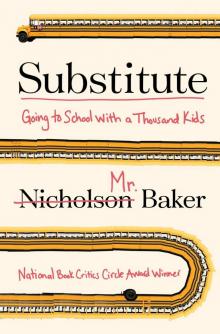 Substitute
Substitute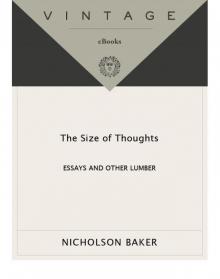 The Size of Thoughts
The Size of Thoughts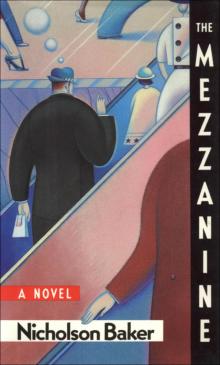 Mezzanine
Mezzanine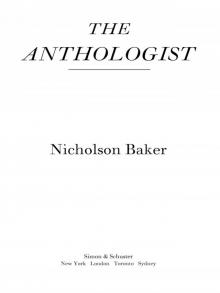 The Anthologist
The Anthologist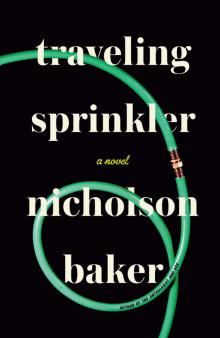 Traveling Sprinkler
Traveling Sprinkler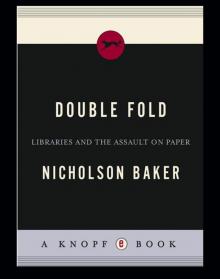 Double Fold
Double Fold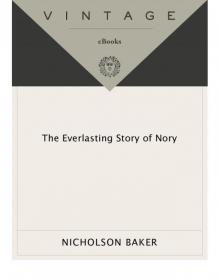 The Everlasting Story of Nory
The Everlasting Story of Nory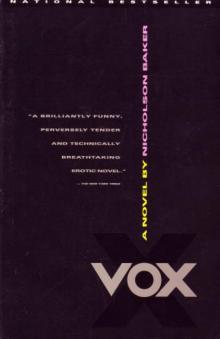 Vox
Vox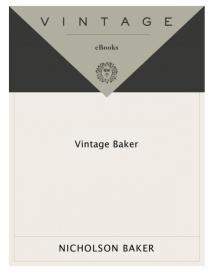 Vintage Baker
Vintage Baker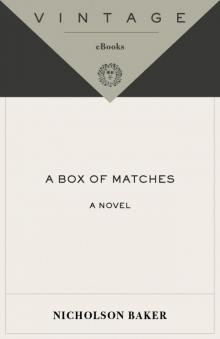 A Box of Matches
A Box of Matches